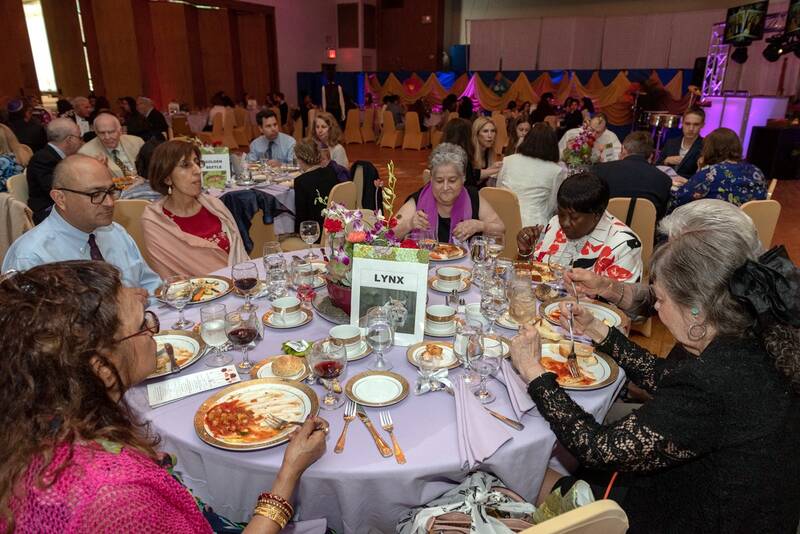
Birth
Riverdale Temple delights in welcoming the arrival of new family members into the covenant of Judaism, and into the temple family. We have various rooms that are perfect for the celebration of a b’rit milah, and if you need guidance in contacting an appropriate mohel, or ritual circumciser, please feel free to contact our rabbi who can advise you about the options available depending on your family’s specific needs.
Temple members are encouraged to celebrate a baby naming — whether for a boy or girl — by being called to the Torah for an aliyah at a Sabbath morning service. Baby namings are usually celebrated at Sabbath services as well — either during an aliyah on Shabbat morning, or at a Friday evening ‘Kabbalat Shabbat’ service. There is no age limit on naming ceremonies for girls (boys usually receive their ritual Hebrew name during the b’rit milah). Children of all ages — and even adults — may choose to celebrate a ritual naming during services. Please contact the rabbi for more information.
B’nei Mitzvah
Member families who send their children through our religious school program are eligible to celebrate a bar or bat mitzvah once the student turns 13 (by either the Hebrew or Gregorian calendar). Students must have been enrolled for at least three years prior to their ceremony, unless they are fluent in Hebrew, and/or attend a Hebrew day school. In such cases, the rabbi will work with the family to determine what type of involvement in the congregation will make the ritual of bar or bat mitzvah most meaningful. Some of our Hebrew-fluent students have served as tutors in the school, or worked with our youth group, or participated in special programs in the congregation in order to feel a sense of identification with Riverdale Temple as their spiritual home. They have added to our sense of community as well.
Unaffiliated families who find themselves desiring a bar or bat mitzvah celebration for their children are encouraged to contact Rabbi Gardner to discuss the options.
Adult instruction in basic Judaism and Hebrew is also available. Adults who did not have the opportunity to celebrate a bar or bat mitzvah ceremony as children may choose to join an Adult Bar/Bat Mitzvah class leading to a shared Sabbath morning service at which they chant from the Torah and Haftarah, and lead major portions of the worship. Classes are formed according to demand. Please contact us if you are interested in joining a class. Rabbi Gardner is also available to work with individuals to prepare a Torah or Haftarah portion for any available Sabbath of their choice.
Weddings
In general, Rabbi Gardner officiates at life-cycle ceremonies only for members of the congregation and their families. This is not only because of the constraints on his time, but primarily because he values the continuity and connection that he can maintain with congregants. The rabbi is, however, always happy to provide counsel and guidance to couples who are contemplating a wedding — whether they are members of the congregation or not. Over the course of his rabbinate, he has developed special expertise in working with interfaith couples to sort out the many issues that can arise, and to help them clarify their plans for the spiritual identity of their family. Please feel free to contact Rabbi Gardner if you are seeking guidance about an interfaith marriage.
Rabbi Gardner, and Riverdale Temple in general, is also firmly committed to marriage equality — both in officiating at same-sex weddings, and welcoming LGBTQ couples and individuals into the congregation.
Bikkur Cholim
Rabbi Gardner would very much appreciate being informed of anyone who is ill, in the hospital, or otherwise in need of a pastoral call. Riverdale Temple also has a committee of devoted and compassionate individuals who regularly visit those members of our community who are home-bound. Please let the temple know of anyone who would like a visit, and if you would like to join in the mitzvah of bikkur cholim (visiting the ill) your participation would be very much welcome. Please contact Rabbi Gardner! rabbigardner@riverdaletemple.org, (718) 548-3800 ext. 4.
We Remember Them – Yizkor and Yahrzeit
There are two words in the Jewish tradition most commonly associated with remembrance of those who have died; yizkor — a Hebrew word meaning “may He [God] remember” and yahrzeit — a Yiddish word meaning anniversary (yahr = year, zeit = time).
The first, Yizkor, refers to a communal worship service that takes place four times a year; on Yom Kippur and traditionally on the additional day of each of the three pilgrimage festivals — Passover, Shavuot, and Sukkot. In Israel where the addition of a day to account for the ancient communication challenges of the Diaspora is not necessary, (and also at Riverdale Temple) Yizkor is observed on the last day of Passover and Sukkot, and on the first (only) day of Shavuot. Yizkor is a relatively recent addition to Jewish worship. The first official record of its inclusion in the Yom Kippur prayers seems to be from the 11th century — probably in reaction to the experiences of the Jewish communities during the crusades. The service derives its name from the first word of the core prayer which begins “Yizkor Elohim et nishmat…” — may God remember the soul of ….” The traditional formulation of that prayer usually includes a monetary pledge in memory of the loved ones for whom one is reciting the prayer. This bit of information may shed light on the spread of the Yizkor service initially from once a year, on Yom Kippur, to the three festivals as well. There seems to be a universal anthropological drive to create physical tributes to those loved ones who have passed out of earthly existence. Thus, almost every synagogue in the world bears names on plaques, pews, doorways, lecterns, arks and every other inscribable surface. In biblical times, our ancestors brought material offerings from their land to the Temple in Jerusalem three times a year. We no longer have a Temple in Jerusalem, and far fewer Jews farm the land, but the remembrance of our loved ones has become an important motivation for sustaining the institutions that, in turn, sustain our heritage. Yizkor became a cherished way to turn the pain of loss into meaningful, visible support for the living.
One of the most widespread and enduring related customs was the writing of “yizkor books” — memorial volumes containing names and information about those one wished to remember. Each entry was, of course, accompanied by a contribution to the community publishing the Yizkor book, but the benefits of those volumes have long outlived many of the communities that produced them. They have become a rich source of knowledge about our past, especially in Europe, that might otherwise have become inaccessible forever.
Riverdale Temple continues this tradition of a Book of Remembrance each year. Entries are collected during the summer and the book is made available to the entire congregation during the Yizkor Service on Yom Kippur. We pray that the institutions producing such texts today will never suffer the destruction of the communities wiped out by waves of persecution. Rather, we publish a Book of Remembrance to encourage every member of the Jewish community to participate in the sustenance of a living and vibrant Judaism.
Yahrzeit is a related, but also wholly different observance. It is a personal commemoration of the anniversary of death of one’s immediate relatives; parent, spouse, sibling or child. Traditionally, one lights a memorial candle on the eve of the actual date of death, and joins a daily minyan (quorum needed for public prayer) to recite kaddish on the anniversary. At Riverdale Temple our custom is for members to observe yahrzeit on the Sabbath immediately following the anniversary, when the names of their loved ones are recalled before the recitation of the kaddish at the conclusion of the service. In addition, our custom is first to ask those who are observing a personal yahrzeit to rise (if they wish) as the name of their loved one is recited, and then to invite the entire congregation to rise in memory of all those who have left behind no immediate mourners. Inviting personal mourners to rise first gives the congregation an opportunity to recognize those who may need an added bit of comfort, a word of sympathy, or perhaps an inquiry about their loss. Asking the rest of the congregation to join them before we begin the words of kaddish is our way of observing a well-established tradition of serving as ‘agents’ for those who are unable to fulfill a religious obligation themselves. Too many horrors in our history have left numberless souls with no one left behind to appeal to God for their remembrance. We feel honored to adopt this practice on as a community even though the ritual obligation technically falls only on immediate relatives.
It must be noted that the observance of yahrzeit, too, was not without its material benefits. It is customary in many congregations for those observing a yahrzeit to pledge a contribution and be called for a pulpit honor — whether a blessing over the Torah, an opening or closing of the ark, etc. — in memory of the deceased. Here, too, we demonstrate the importance of keeping alive the souls, spirits, memories — however we understand that which lives on beyond the grave — by sustaining the communities that support our own spiritual existence.
Mourner’s Kaddish
Yitgadal v’yitkadash sh’mei raba.
B’alma di v’ra chirutei,
v’yamlich malchutei,
b’chayeichon uv’yomeichon
uv’chayei d’chol beit Yisrael,
baagala uviz’man kariv. V’im’ru: Amen.
Y’hei sh’mei raba m’varach
l’alam ul’almei almaya.
Yitbarach v’yishtabach v’yitpaar
v’yitromam v’yitnasei,
v’yit’hadar v’yitaleh v’yit’halal
sh’mei d’kud’sha b’rich hu,
l’eila min kol birchata v’shirata,
tushb’chata v’nechemata,
daamiran b’alma. V’imru: Amen.
Y’hei sh’lama raba min sh’maya,
v’chayim aleinu v’al kol Yisrael.
V’imru: Amen.
Oseh shalom bimromav,
Hu yaaseh shalom aleinu,
v’al kol Yisrael. V’imru: Amen.
Translation:
Glorified and sanctified be God’s great name throughout the world
which He has created according to His will.
May He establish His kingdom in your lifetime and during your days,
and within the life of the entire House of Israel, speedily and soon;
and say, Amen.
May His great name be blessed forever and to all eternity.
Blessed and praised, glorified and exalted, extolled and honored,
adored and lauded be the name of the Holy One, blessed be He,
beyond all the blessings and hymns, praises and consolations that
are ever spoken in the world; and say, Amen.
May there be abundant peace from heaven, and life, for us
and for all Israel; and say, Amen.
He who creates peace in His celestial heights,
may He create peace for us and for all Israel;
and say, Amen.


